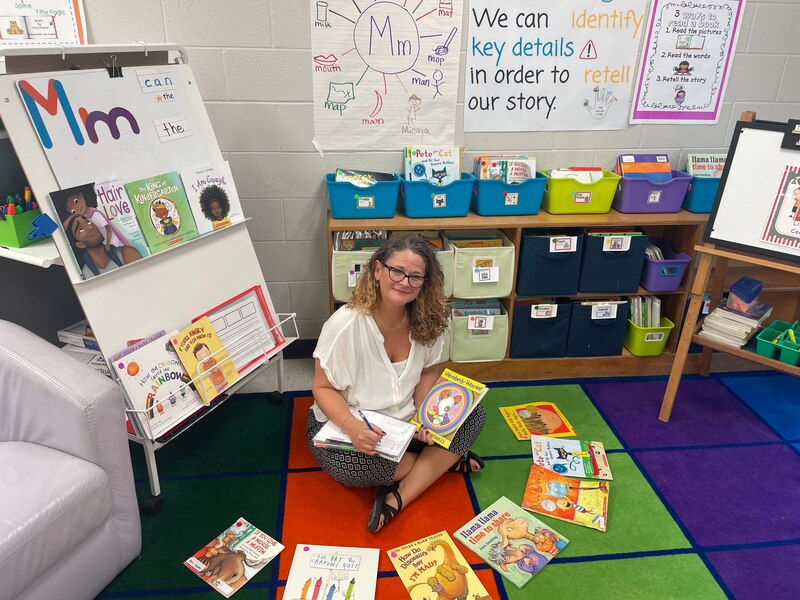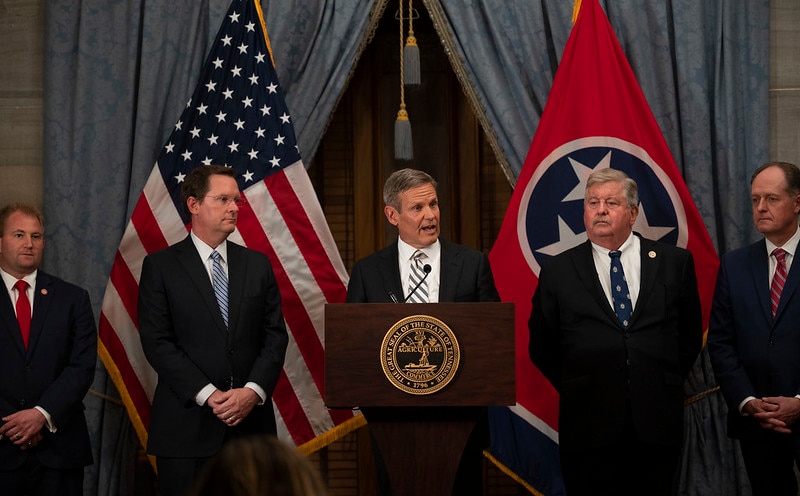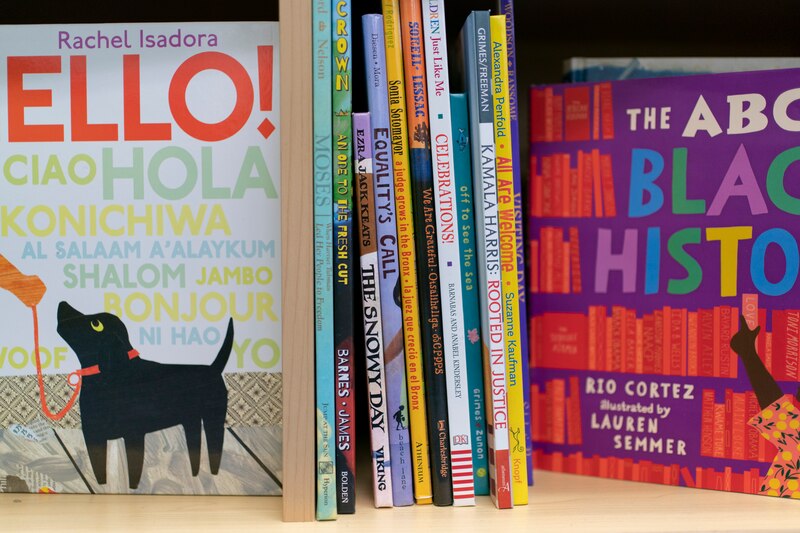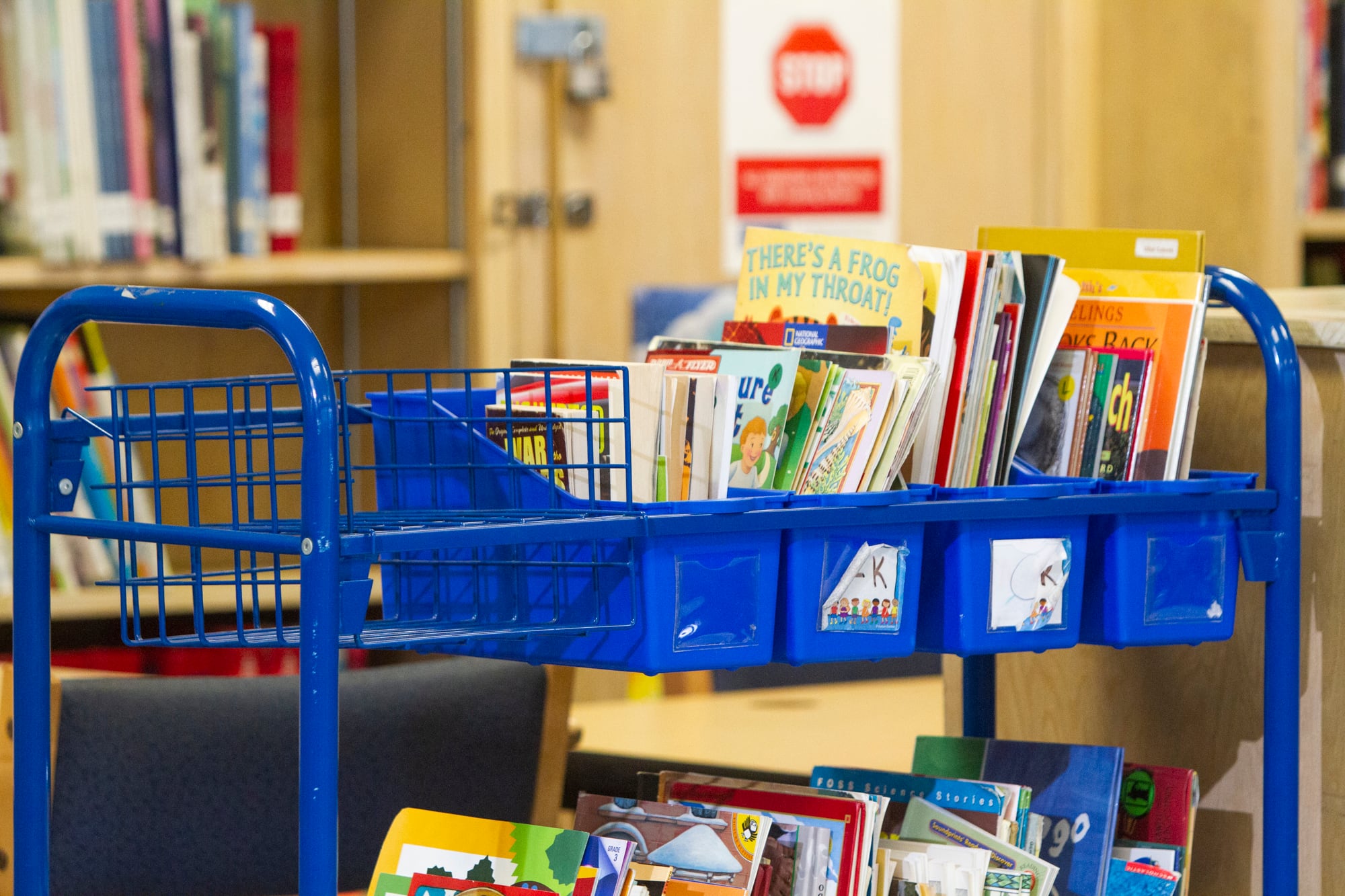On a large colorful rug, several schoolchildren sat with their legs crossed. Others stretched out on their stomachs. All were poring over pages and unraveling words and stories from books like “Pete the Cat,” “Time for Breakfast,” and “The Tiny Seed.”
It’s reading time in Tahna White’s kindergarten classroom.
Her self-funded library collection anchors a joyful and eye-catching corner of her teaching space at Lowrance K-8 School in Memphis. Minutes earlier, her students were browsing through blue, purple, and green book bins sorted by themes like llamas, plants, feelings, and stories written by Eric Carle.
“They absolutely love going through these books,” said White, who has a master’s degree in language and literacy and has amassed about 500 children’s titles during her 20 years of teaching.
Still, White is prepared to box the books up and take them home if Memphis-Shelby County Schools directs her to catalog each one under a new state law aimed at school libraries.
“The task would be enormous, and I don’t know when I’d have time to do it myself,” she said. “Pretty much all my parents work, so it’s unlikely they’d have time to volunteer and help.”
Teachers and school leaders across Tennessee are trying to figure out how to satisfy recent state guidance on the 2022 library law. The statute requires public schools to scrutinize their library materials for “age appropriateness” and publish the full inventory for parents to view online.
Republican Gov. Bill Lee said the purpose was to “ensure parents know what materials are available to students in their libraries.”
But an Aug. 11 memo to district leaders said that under the law, a library collection is not limited to materials found in a traditional school library. It also includes “materials maintained in a teacher’s classroom,” wrote Christy Ballard, general counsel for the state education department.
Soon after, several school systems, including large districts in Chattanooga and Murfreesboro, instructed their teachers to begin cataloging their classroom collections by title and author, along with a brief description of each book — just as the new school year was beginning.
“So most teachers have hundreds of books,” said third-grade teacher Sydney Rawls, whose viral TikTok video showed her spending one Saturday creating an inventory, book by book, at Mitchell-Neilson School in Murfreesboro, south of Nashville.
Rawls described how her students beg to read from her collection after they finish a test or assignment, “and I have to say no, you can’t, because I haven’t had a chance to go through all of them to catalog them, to write them all down.”
For White and other educators who may face the same task, the answer may be just removing the books they’ve personally curated for their classrooms. It’s an option that some teachers have discussed on social media.

Tennessee has a reading problem
Removing reading materials to comply with a state law would be an ironic twist for a state that has been trying for years to help its children become better readers.
Only one-third of Tennessee fourth-graders earned a proficient reading score in 2019 on the most recent national tests conducted by the National Assessment of Educational Progress, also called the Nation’s Report Card.
In Memphis, home to the state’s largest district, nearly 80% of students aren’t reading at grade level.
The same legislature that passed the governor’s library proposal, dubbed the “Age Appropriate Materials Act,” approved a raft of measures the prior year aimed at improving students’ literacy skills.
As a result, all K-12 schools have adopted phonics-based reading instruction, while colleges have revised their training accordingly for aspiring teachers. Also, beginning this school year, one controversial new law increases the likelihood that schools will hold back students who aren’t considered proficient in reading by the end of third grade.
The prospect of children losing access to books because of teachers balking at cataloging their collections is something the governor and the law’s two GOP sponsors — Sen. Jack Johnson and Rep. William Lamberth — aren’t talking about.
None responded to questions or accommodated interview requests from Chalkbeat.

Others involved in the library law’s development say they were taken aback by the state’s broad interpretation of what constitutes a school library.
“We don’t think that was the legislative intent,” said Dale Lynch, who leads the state’s superintendents organization.
“It obviously means a whole lot of work for teachers.”
Lindsey Kimery, past president of the Tennessee Association of School Librarians, said the governor’s chief of staff and policy adviser never mentioned classroom collections when discussing the legislation with representatives of her group earlier this year.
“It’s exactly the kind of thing that we were afraid of,” she said of the law’s expanded scope. “At the end of the day, this creates one more barrier to easy book access for students who have no problem accessing things like video games or cellphones.”
State Rep. Sam McKenzie, who serves on a House education committee, doesn’t recall classroom book collections being discussed during debates about the legislation.
The Knoxville Democrat plans to propose his own legislation next year to clarify that the library law does not extend to classrooms.
“This is a classic example of government overreach,” he said. “We need to get out of the way and let our teachers teach.”
Book bans have heightened tensions
Tennessee was already under a national spotlight last school year for several high-profile book bans.
Then lawmakers passed several bills aimed at restricting the kinds of books that students can read. In addition to the governor’s library review law, one measure lets the state textbook commission overrule local school board decisions and remove materials from school libraries statewide if they are deemed “inappropriate for the age or maturity levels” of students.
Tennessee was also among the first states to enact a law intended to restrict classroom discussions about the legacy of slavery, racism, and white privilege.
“What’s driving the whole debate is a push to get rid of books about race, gender, and sex,” said JC Bowman, executive director of the Professional Educators of Tennessee.

But fourth-grade teacher Karolyn Marino worries that, based on how educators are responding to the state’s definition of a school library, classic books will get pushed out of classrooms.
“Somehow, this law went down a rabbit hole that’s gone too far,” said Marino, who teaches in Williamson County, south of Nashville, and also serves on the board of the Professional Educators of Tennessee.
“It’s not that the ‘Adventures of Huckleberry Finn’ will end up in a trash can; it’s that Huck Finn will end up somewhere in a box,” she said.
Most districts are exploring their options
Marino’s district, Williamson County Schools, is still determining how to comply with the law and new guidance, as are most school systems across Tennessee.
“Metro Nashville Public Schools was already in compliance with the new law based on the classic definition of a school library,” said spokesman Sean Braisted, noting that district leaders are developing a plan to address the broader interpretation.
“We will seek to do so in such a way that minimizes any burden placed on teachers who are rightfully focused on providing the academic instruction and support to their students,” he added.
That could mean giving teachers a tool to create a listing of their classroom collections without typing it out by hand. With the right resource, they could just scan a barcode on each book to automatically fill in the title, author, and description.
But such tools don’t come cheap. Kimery, who coordinates library services for Nashville schools, priced one system at $64,000 a year.
Others, like Williamson County’s Marino, say the state should pay teachers a stipend for any additional work required under the law.
The legislature’s fiscal analyst didn’t identify such potential costs when studying the governor’s proposal. The bill’s fiscal note said schools and districts “will be able to comply with the proposed legislation using existing resources during the normal course of business; therefore, any fiscal impact to state or local government is estimated to be not significant.”
In Memphis, White is ready to pack up her books if her district doesn’t come up with a workable plan for complying with the law. But for now, she is using them every day to help her students with reading, which is considered the foundation for learning and success in all subject areas.
“Our goal is to create lifelong readers,” White said, “but you can’t do that without books.”
Marta W. Aldrich is a senior correspondent and covers the statehouse for Chalkbeat Tennessee. Contact her at maldrich@chalkbeat.org.







